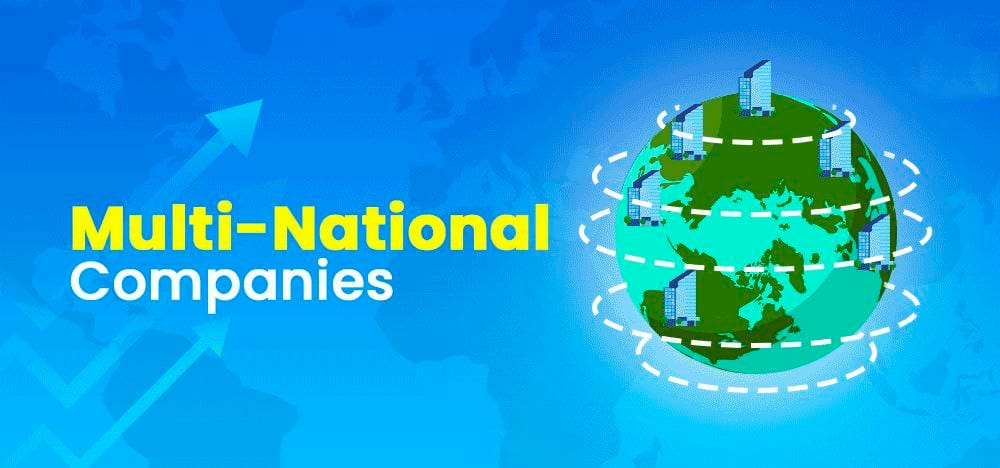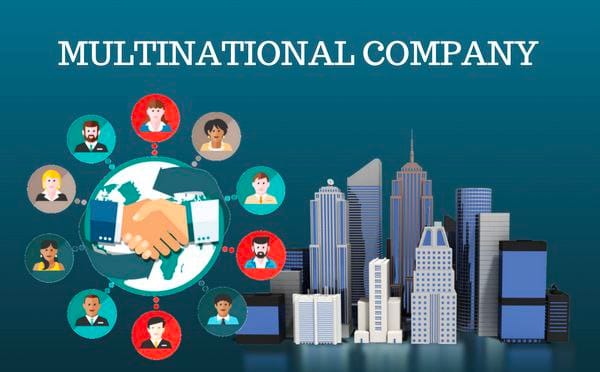Meaning of Multinational Corporations (MNCs)
A Multinational Corporation (MNC) is a company that operates in multiple countries, managing production or delivering services in more than one country outside its home base. MNCs leverage their global presence to access resources, markets, and efficiencies that may not be available in a single country. These corporations play a crucial role in international trade and the global economy, influencing economic policies, labor practices, and consumer behavior on a global scale.
MNCs have the capacity to influence the economies of countries where they operate by generating employment, investing in infrastructure, and fostering technological advancements. They are key players in driving globalization, enabling the flow of capital, goods, and services across borders.

Definitions of Multinational Corporations
- According to Charles W.L. Hill:
- “A multinational corporation is a business that has productive activities in two or more countries.”
- According to Franklin Root:
- “A multinational corporation is a parent company that engages in foreign production through its subsidiaries located in several countries, exercises direct control over the policies of its subsidiaries, and implements business strategies in production, marketing, finance, and staffing that transcend national boundaries.”
- United Nations (UN) Definition:
- The UN defines a multinational corporation as “an enterprise which owns or controls production or services facilities outside the country in which it is based.”

Characteristics of Multinational Corporations
- Global Presence:
- The most defining characteristic of MNCs is their operation in multiple countries. MNCs set up production facilities, offices, and subsidiaries in various regions around the world to take advantage of new markets, lower production costs, or access to resources.
- Centralized Control:
- Despite their global presence, MNCs maintain centralized control from their headquarters, usually located in the home country. This centralized decision-making ensures consistency in management practices, policies, and strategies across all international branches.
- Large Scale Operations:
- MNCs operate on a large scale, both in terms of production and market reach. They have substantial financial resources and employ large numbers of workers across different countries. For example, companies like Apple, Toyota, or Coca-Cola have extensive global operations.
- Diversification of Markets:
- MNCs are typically diversified across several markets and regions, reducing their dependence on any single market. This geographic diversification helps them mitigate risks such as political instability, currency fluctuations, or changes in local market demand.
- Access to Advanced Technology:
- MNCs tend to possess advanced technology and knowledge, which they often transfer to the countries in which they operate. Their technological superiority enables them to produce goods more efficiently and maintain a competitive edge in the global marketplace.
- Economies of Scale:
- Due to their large-scale operations, MNCs benefit from economies of scale, allowing them to reduce costs through mass production, bulk purchasing, and efficient distribution networks. These advantages often make it difficult for local companies in host countries to compete.
- Ability to Shift Resources:
- MNCs have the flexibility to shift resources such as capital, technology, and labor from one country to another based on their strategic needs. This ability to relocate production or services allows them to exploit favorable conditions in different countries, such as lower labor costs or tax benefits.
- International Market Strategies:
- MNCs deploy tailored strategies for different markets, taking into account local preferences, regulations, and cultural differences. For example, fast-food chains like McDonald’s or Starbucks adapt their menus to suit local tastes while maintaining their global brand identity.
- Influence on Global Trade:
- MNCs significantly influence international trade and investment flows. Their decisions on where to produce goods, invest capital, and open new branches impact trade policies, labor markets, and regulatory environments globally.
- High Level of Competition:
- MNCs often face intense competition from other global corporations. They continually innovate in products, marketing, and processes to stay ahead in global markets. Their ability to invest in research and development gives them an edge in creating new products and services.
- Transfer Pricing:
- One strategy used by MNCs is transfer pricing, where the company sets prices for transactions between its subsidiaries located in different countries. This allows MNCs to take advantage of tax differences between nations, though this practice can sometimes lead to regulatory scrutiny.
- Foreign Direct Investment (FDI):
- MNCs are major players in foreign direct investment (FDI). They establish subsidiaries or acquire companies in foreign countries to increase production capacity or access local markets. Through FDI, MNCs inject capital into host countries, often improving local economies.
- Corporate Social Responsibility (CSR):
- Many MNCs adopt Corporate Social Responsibility (CSR) initiatives to contribute positively to the societies in which they operate. CSR programs may focus on environmental sustainability, social equity, labor rights, and community development.
- Influence on Government Policies:
- MNCs can have significant influence on government policies in host countries, particularly in areas like trade regulations, labor laws, and environmental standards. Some governments offer tax breaks or other incentives to attract MNC investments, though this can lead to concerns about excessive corporate influence.

Examples of Multinational Corporations
- Apple Inc.: Based in the U.S., Apple designs and sells electronics globally, but manufactures its products in countries like China and other parts of Asia.
- Toyota: A Japanese multinational company, Toyota manufactures automobiles in several countries and sells them across the globe.
- Nestlé: A Swiss multinational, Nestlé produces a wide range of food and beverages and operates in numerous countries worldwide.
Multinational corporations are central to the functioning of the global economy, leveraging their expansive resources, market knowledge, and influence to operate effectively in many different environments. They foster globalization, create employment, and contribute to economic growth but also face scrutiny for their business practices and impact on local economies.


It’s going to be end of minhe day, but before finish I am reading this fantastic article to improve
mmy experience. http://boyarka-inform.com/